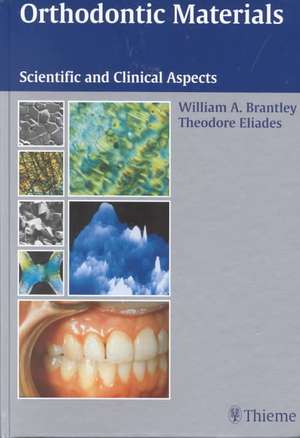Orthodontic Materials: Scientific and Clinical Aspects
Autor Wiliam A. Brantley, Theodore Eliadesen Limba Engleză Hardback – 17 oct 2000
In this important new textbook all scientific and clinical aspects of orthodontic materials are described. Recent developments in science and technology have led to the introduction of a plethora of new orthodontic products. This work serves as an excellent source of information for a field that requires knowledge of basic elements of materials science, engineering, chemistry, and physics, as well as clinical orthodontics. The subject has been part of graduate orthodontic education for almost three decades. Besides servicing the orthodontic training programs, the book also:
- investigates the interactions of orthodontic materials with other dental materials as well as hard tissues in the oral cavity,
- gives a background to allow for proper material selection for efficient orthodontic mechanics, and
- treats the issues of biocompatibility, cytotoxicity and mutagenicity of materials.
Preț: 763.33 lei
Preț vechi: 803.50 lei
-5% Nou
Puncte Express: 1145
Preț estimativ în valută:
146.08€ • 151.95$ • 120.60£
146.08€ • 151.95$ • 120.60£
Carte indisponibilă temporar
Doresc să fiu notificat când acest titlu va fi disponibil:
Se trimite...
Preluare comenzi: 021 569.72.76
Specificații
ISBN-13: 9780865779297
ISBN-10: 0865779295
Pagini: 320
Ilustrații: 232
Dimensiuni: 173 x 239 x 18 mm
Greutate: 0.82 kg
Ediția:1st edition
Editura: Thieme
Colecția Thieme
ISBN-10: 0865779295
Pagini: 320
Ilustrații: 232
Dimensiuni: 173 x 239 x 18 mm
Greutate: 0.82 kg
Ediția:1st edition
Editura: Thieme
Colecția Thieme
Recenzii
The first time that the scientific and clinical aspects of the vast array of orthodontic materials have been incorporated into a single textbook..The authors and 16 contributing experts are to be congratulated on producing a book the scope of which provides excellent background for researchers. --American Journal of Orthodontics and Dentofacial OrthopaedicsImpressive...bridges the gap between basic scientific theory and clinical application...abundant high-quality illustrations...any private practitioner would not only benefit from the book, but would enjoy just flipping through it. --Journal of Clinical OrthodonticsA wealth of information...a very readable and well-crafted textbook. It fills a gap in the orthodontic literature and will be of great value to all practicing orthodontists, as well as those involved in laboratory-based research related to orthodontic materials. --Dental UpdateThe editors have managed to successfully combine the science of orthodontic materials with helpful information in relation to their clinical usage...well illustrated...essential reading for orthodontic postgraduate students and for their supervisors. --Journal of OrthodonticsProvides a thorough and detailed examination of many subjects related to orthodontic materials...provides extensive reviews of a wide range of topics...the orthodontist will gain a great deal from this book...an excellent reference...invaluable. --Australian Orthodontic JournalThe first chapter is a concise review of terms and basic structures...graduate students will appreciate the discussions...of significant interest to practicing orthodontists...concise summations... --Montgomery-Bucks Dental Society Bulletin
Notă biografică
Doctoral Fellow, Biomaterials Science Unit, Turner Dental School, University of Manchester, UK, Private Practice in Orthodontics, Athens, Greece
Textul de pe ultima copertă
In this important new textbook all scientific and clinical aspects of orthodontic materials are described. Recent developments in science and technology have led to the introduction of a plethora of new orthodontic products. This work serves as an excellent source of information for a field that requires knowledge of basic elements of materials science, engineering, chemistry, and physics, as well as clinical orthodontics. The subject has been part of graduate orthodontic education for almost three decades. Besides servicing the orthodontic training programs, the book also:
- investigates the interactions of orthodontic materials with other dental materials as well as hard tissues in the oral cavity,
- gives a background to allow for proper material selection for efficient orthodontic mechanics, and
- treats the issues of biocompatibility, cytotoxicity and mutagenicity of materials.
